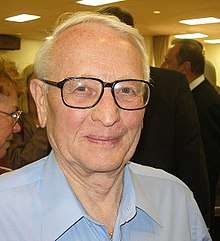David Cargo
| David Cargo | |
|---|---|
 | |
| 22nd Governor of New Mexico | |
|
In office January 1, 1967 – January 1, 1971 | |
| Lieutenant | Lee Francis |
| Preceded by | Jack M. Campbell |
| Succeeded by | Bruce King |
| Member of the New Mexico House of Representatives | |
|
In office January 1, 1963 – January 1, 1967 | |
| Personal details | |
| Born |
David Francis Cargo January 13, 1929 Dowagiac, Michigan, U.S. |
| Died |
July 5, 2013 (aged 84) Albuquerque, New Mexico, U.S. |
| Resting place |
Santa Fe National Cemetery Santa Fe, New Mexico |
| Political party | Republican |
| Spouse(s) | Ida Jo Cargo |
| Alma mater | University of Michigan Law School |
| Military service | |
| Allegiance |
|
| Service/branch |
|
| Years of service | 1953-1955 |
David Francis Cargo (January 13, 1929 – July 5, 2013) was the 22nd Governor of New Mexico, having served between 1967 and 1971.[1]
Life and career
Cargo was born in Dowagiac in Cass County in southwestern Michigan,[1] the eldest of three children of Francis and Mary Harton Cargo.[2] He received a Bachelor of Arts (1951), Master of Arts (1953), and in 1957, a L.L.B., all from the University of Michigan at Ann Arbor.[1]
He represented the Albuquerque area in the New Mexico House of Representatives from 1963 to 1967, when he was elected governor at the age of thirty-seven.[1] As a representative he won one of the first lawsuits forcing proportional representation in the state legislature.[1] He remains one of the youngest governors elected to date in U.S. history, along with Harold Stassen in Minnesota (1938), Bill Clinton in Arkansas (1978), Christopher "Kit" Bond and Matt Blunt in Missouri (1972) and (2004), respectively, and Bobby Jindal in Louisiana (2007).
Elected as governor, January 1967 to January 1971
Cargo was considered a liberal Republican, more in the Nelson Rockefeller mode than in the image of Barry Goldwater of neighboring Arizona. He had difficulty winning the Republican primaries in both 1966 and 1968; both times he faced State Representative Clifford J. Hawley of Santa Fe.[3] In 1966, Cargo won with 17,836 (51.8 percent) to Hawley's 16,588 (48.2 percent).[4] He improved his primary performance in 1968, when he defeated Hawley, 28,014 (54.9 percent) to 23,052 (45.1 percent).[5]
Cargo won the general election of 1966, when he barely defeated Democrat Gene Lusk. Cargo received 134,625 votes (51.7 percent) to Lusk's 125,587 (48.3 percent).[4] Running again in 1968, Cargo won by an even smaller margin, 160,140 (50.5 percent) to Democrat Fabian Chavez Jr.,'s 157,230 ballots (49.5 percent).[5]
Cargo was the first activist Governor to bring significant changes to the Penitentiary of New Mexico (PNM). During his first few months in office, while Felix Rodriguez was acting Warden of the Penitentiary of New Mexico, Governor Cargo conducted a thorough nationwide search to find a permanent replacement for Warden Cox who had died in October 1966 while Warden of the Penitentiary of New Mexico (PNM). Cargo was looking for someone who could bring to the Penitentiary, reforms for rehabilitation which had been instituted in other states such as California and the Federal prisons. For Cargo, as a liberal Republican, prisoner rehabilitation went hand-in-hand with fighting poverty. President Lyndon Johnson's War on Poverty included funding for education in prisons through Project Newgate. Governor Cargo found his agent for change at the penitentiary in J.E. Baker, a correctional administrator from the federal prison system, who Cargo appointed PNM's new warden in June 1967. Baker had a reputation as one of the most innovative correctional administrators in the U.S.. Baker's ideas about prison management were similar to those of Thomas Mott Osborne and Howard B. Gill, who in the early twentieth century had experimented with inmate programs for rehabilitation.[6]
After Nixon was inaugurated as president, the money for the war on poverty slowly started being diverted to the war in Vietnam. This meant the Federal program called Project NewGate that financed rehabilitation programs for U.S. prisons was slowly being phased out. Federal money for education programs in prisons across the country would slowly disappear by Christmas 1973.[7] Even though Governor Cargo appointed Baker as Secretary of Corrections for the whole state of New Mexico in July 1969, the newly elected senate committee refused to confirm him in February 1970. Governor Cargo angrily described the action as a "Legislative Lynching".[8] His words took on added meaning when the State Senate went on to change the job description by separating the Secretary of Corrections from operations at the penitentiary. By February 23, 1970 Governor Cargo appointed Rodriguez to both the Warden of the Penitentiary of New Mexico (PNM) and head of Adult prison institutions, which included the minimum-security farm in Los Lunas where the produce and the beef was raised and shipped to PNM.[9]
The secretary of corrections job instead went to Dr. John Salazar, who had been a consulting psychologist at the penitentiary.[10] Both Baker and Salazar reportedly believed that first time offenders - particularly young ones - should not be confined with hard-core convicts at the state prison, but should be kept at the minimum-security farm. According to Salazar, that concept was furiously opposed by Rodriguez as it interfered with his way of managing the prisons.
Adhering to his belief that first time offenders should not be thrown together with hard-core violators, Salazar ordered Assistant Warden Horacia Herrera to transfer a 19 year old boy named Lovelady, to the intermediate correctional unit at Los Lunas. When he attempted to institute this, the Deputy Warden of PNM, Horacio Herrera, refused to transfer the prisoner. Salazar fired him for "failing to obey an order from a duly authorized official". Rodriguez completely disagreed with Salazar, and immediately went to Governor Cargo threatening to resign unless Salazar was removed from office and Herrera was re-hired as his Assistant Deputy Warden.[11]
Apparently fearing Rodriguez's far-reaching political power, Governor Cargo supported him and forced Salazar to resign. The new Secretary of Corrections obediently and immediately reinstated Horacio Herrera and all rehabilitation slowed to a halt.[12]
By April 1970, after only three months in office, Salazar was removed. For the next five years, Rodriguez garnered a clique around him to determine penitentiary policy with accountability to no one.
As governor, Cargo started the state film commission, which brought millions of dollars in revenue to the state of New Mexico.[13] Cargo established ties to Hollywood and was even asked to appear in several films. In 1971, he made a cameo appearance in Bunny O'Hare, starring Bette Davis and Ernest Borgnine, as well as in Up in the Cellar (1970), starring Larry Hagman and Joan Collins. During his first campaign for governor, he was known as "Lonesome Dave."[13]
Later losing campaigns
Cargo could not seek a third two-year term in 1970. Gubernatorial terms were changed to one four-year term in which a person could not seek consecutive re-election with the 1970 election, and subsequently two four-year terms with the 1990 election.[14] Cargo hence ran for the U.S. Senate in 1970, but he lost the Republican primary to the conservative choice, Anderson "Andy" Carter.[15] Carter polled 32,122 (57.8 percent) to Cargo's 17,951 (32.3 percent).[16] Andy Carter then lost the general election to incumbent Democrat Joseph M. Montoya.[16] Cargo tried for New Mexico's other Senate seat in 1972 but again lost the primary, this time to the eventual senatorial winner, Pete Domenici.[15]
From 1973 until 1985, Cargo relocated to Lake Oswego, Oregon, with his wife, Ida Jo, and five children, Veronica, David, Patrick, Elena, and Eamon. In 1984, he was an unsuccessful candidate for the Republican nomination for state treasurer in Oregon.[15]
After returning to New Mexico, Cargo won the Republican nomination for Congress in 1986 for New Mexico's 3rd congressional district but was defeated by the incumbent, Democrat Bill Richardson.[15] Cargo ran for mayor of Albuquerque in 1993 but lost to Martin Chávez.[15] He tried for a gubernatorial comeback in 1994 but finished in fourth place with 13 percent in the primary and lost to the eventual winner, Gary Johnson.[17] Cargo made his final race in 1997 when he again contested the Albuquerque mayoralty, but he finished third and lost to Jim Baca.[18]
Despite his many political defeats, Cargo continued to practice law in Albuquerque.[1] In 2010, he wrote an autobiography titled Lonesome Dave.[19]
Cargo died at the age of eighty-four of complications of a stroke which he had two years earlier.[13]
References
- 1 2 3 4 5 6 "Cargo, David F." New Mexico Office of the State Historian. Archived from the original on March 9, 2012. Retrieved December 28, 2010.
- ↑ Kallenbach, J.E.; Kallenbach, J.S. (1977). American State Governors, 1776-1976. 3. Oceana Publications. Retrieved September 13, 2015.
- ↑ Associated Press (May 4, 1966). "Governor Race Sparks Contest in New Mexico". St. Petersburg Times. Retrieved July 6, 2013.
- 1 2 Scammon, Richard M. (1967). America Votes. 7.
- 1 2 Scammon, Richard M. (1969). America Votes. 8.
- ↑ Mark Colvin (1992), Penitentiary in Crisis, p. 53-54
- ↑ Rex Herron and John Muir (January 1974), "The History and Development of Project NewGate: A Program of Post-Secondary Education for Incarcerated Offenders", Office of Economic Opportunity, Grant Number 20045, p. 48
- ↑ Adolph Saenz (1986), Politics of a Prison Riot, p. 148
- ↑ Adolph Saenz (1986), Politics of a Prison Riot, p. 148
- ↑ Adolph Saenz (1986), Politics of a Prison Riot, p. 148
- ↑ Adolph Saenz (1986), Politics of a Prison Riot, p. 149
- ↑ Adolph Saenz (1986), Politics of a Prison Riot, p. 149
- 1 2 3 "Former NM Governor Dave Cargo Dies". KRQE.com. Archived from the original on 2013-07-07. Retrieved September 14, 2015.
- ↑ "Constitution Of The State Of New Mexico - Article V, Section 1" (PDF). New Mexico Secretary Of State. Retrieved August 20, 2011.
- 1 2 3 4 5 Terrell, Steve (July 5, 2013). "Former New Mexico Gov. David Cargo dead at 84". The Santa Fe New Mexican. Retrieved July 6, 2013.
- 1 2 Scammon, Richard M. (1971). America Votes. 9.
- ↑ "Canvass of Returns of Primary Election Held on June 7, 1994 - State of New Mexico" (PDF). New Mexico Secretary of State. Retrieved July 6, 2013.
- ↑ "City of Albuquerque Regular Municipal Unofficial Election Results October 7, 1997". Bernalillo County Clerk's Office. October 7, 1997. Archived from the original on August 29, 2013. Retrieved July 6, 2013.
- ↑ "Books: Lonesome Dave". Sunstone Press. Retrieved December 28, 2010.
External links
| Party political offices | ||
|---|---|---|
| Preceded by Merle Tucker |
Republican nominee for Governor of New Mexico 1966, 1968 |
Succeeded by Pete Domenici |
| Political offices | ||
| Preceded by Jack Campbell |
Governor of New Mexico 1967–1971 |
Succeeded by Bruce King |
